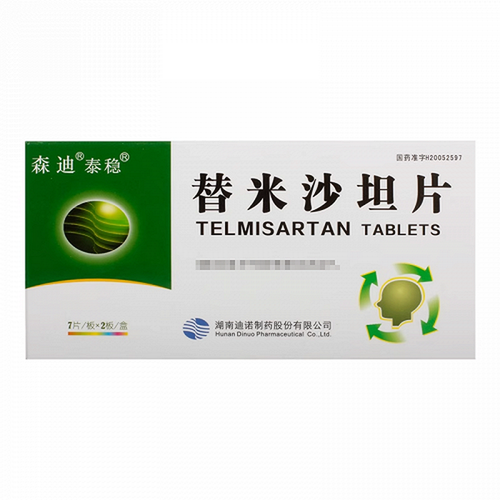Product Overview
[Drug Name]
Generic Name: Telmisartan Tablets
Trade Name: DiSaiPing Telmisartan Tablets 20mg*30 Tablets
Pinyin Full Code: DiSaiPing TiMiShaTanPian 20mg*30 Tablets
[Main Ingredient]
Telmisartan.
[Properties]
This product is a white or slightly yellowish oval tablet.
[Indications/Main Functions]
For the treatment of essential hypertension.
[Specifications]
20mg*30 tablets
[Dosage and Administration]
Individualized dosing. The usual initial dose is 40mg once daily. Telmisartan's antihypertensive effect is dose-dependent within the 20-80mg dose range. If optimal blood pressure is not achieved after treatment, the dose may be increased to a maximum of 80mg once daily.
[Adverse Reactions]
Common Infections: Symptoms of infection (e.g., urinary tract infections, including cystitis), upper respiratory tract infections, including pharyngitis and sinusitis. Nervous System: Uncommon: Anxiety. Eyes: Uncommon: Abnormal vision. Ear and vestibular function: Uncommon: Dizziness. Gastrointestinal: Common: Abdominal pain, diarrhea, dyspepsia. Uncommon: Dry mouth, flatulence. Rare: Stomach discomfort. Skin and subcutaneous tissue: Common: Eczematous skin lesions. Uncommon: Hyperhidrosis. Musculoskeletal: Common: Arthritis, back pain (e.g., sciatica), leg cramps or leg pain, myalgia. Uncommon: Tendonitis. Systemic and application site reactions: Common: Chest pain, flu-like symptoms. In addition, since the marketing of telmisartan, there have been rare case reports of erythema, pruritus, syncope, insomnia, depression, stomach discomfort, vomiting, hypotension (including orthostatic hypotension), bradycardia, tachycardia, abnormal liver function, liver disease, renal impairment including acute renal failure (see [Precautions]), hyperkalemia, dyspnea, anemia, eosinophilia, thrombocytopenia, asthenia, and lack of efficacy. The frequency of these events is unknown. Angioedema, urticaria, and other related cases have been reported as events independent of other angiotensin II receptor antagonists. Laboratory findings: Decreased hemoglobin or elevated blood uric acid may occasionally be observed, occurring more frequently with telmisartan than with placebo. Increases in creatinine or creatinine elevations may be observed with telmisartan, but the incidence of these laboratory changes is similar to or slightly lower than with placebo. Additionally, elevated blood creatine kinase (CPK) has been reported since telmisartan was marketed.
[Contraindications]
1. Hypersensitivity to the active ingredient or any of the excipients of this product. 2. Pregnant women in their second or third trimesters or breastfeeding women. 3. Patients with biliary obstructive disease. 4. Patients with severe hepatic insufficiency. 5. Patients with severe renal impairment (creatinine clearance 30 ml/min).
[Drug Interactions]
Drugs or therapeutic classes that may cause hyperkalemia: Potassium-containing salt substitutes, potassium-sparing diuretics, angiotensin-converting enzyme inhibitors, angiotensin II receptor antagonists, nonsteroidal anti-inflammatory drugs (including selective COX-2 inhibitors), heparin, immunosuppressants (cyclosporine or tacrolimus), and trimethoprim. The development of hyperkalemia depends on associated risk factors. The risk is increased with the aforementioned therapeutic combinations. The risk is particularly high with the combined use of angiotensin-converting enzyme inhibitors or nonsteroidal anti-inflammatory drugs with potassium-sparing diuretics or potassium-containing salt substitutes, but the risk is lower with angiotensin-converting enzyme inhibitors if precautions are strictly adhered to.
[Precautions]
1. Avoid spicy foods. 2. Do not use if allergic to this product. Use with caution if allergic. 3. Do not use if the product's properties have changed. 4. Keep out of reach of children. 5. If you are taking other medications, consult a physician or pharmacist before using this product.
[Overdose]
No cases of overdose have been reported. The most likely manifestations of telmisartan overdose are hypotension and tachycardia; bradycardia may also occur. Telmisartan cannot be eliminated by hemodialysis. In the event of an overdose, the patient should be closely observed and symptomatic and supportive care should be provided. Treatment should be tailored to the timing of ingestion and the severity of symptoms. Recommended measures include inducing vomiting and/or gastric lavage. Activated charcoal may be effective in treating overdose. Serum electrolytes and creatinine should be closely monitored. If orthostatic hypotension occurs, the patient should be placed supine and salt and fluid intake should be promptly replaced.
[Pharmacology and Toxicology]
Telmisartan dissociates angiotensin II, which has a high affinity for the AT1 receptor, from its binding site. Telmisartan does not have partial AT1 receptor agonism. It selectively binds to the AT1 receptor and has a prolonged action, while having no affinity for AT2 and other AT receptor subtypes, the functions of which are currently unknown. Telmisartan may increase angiotensin II levels. The effects of overactivation of AT2 and other AT receptor subtypes by angiotensin II are unclear. Telmisartan reduces aldosterone levels. It does not inhibit human plasma renin activity or block ion channels, nor does it inhibit angiotensin-converting enzyme (ACE), which degrades bradykinin. Therefore, telmisartan does not potentiate bradykinin-mediated adverse reactions. In male patients, administration of 80 mg of telmisartan almost completely inhibits the angiotensin I-induced increase in blood pressure. The inhibitory effect persists for 24 hours and is still measurable up to 48 hours.







